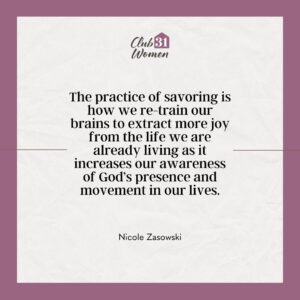Three Practices to Experience More Joy {in the life you already have}
How can you experience more joy in your life? Are you sabotaging your joy? There are three things you can practice right where you are.

When we think of celebration, we tend to picture a joyful reaction to good news or a reward for an accomplishment. We wait for a reason to celebrate. As a result, we often see our joy sitting on the other side of a dream realized or a goal achieved. Certainly, good news, accomplishments, and dreams are worthy of celebration.
But if these were our only permission slips for joy, celebration would be an experience for the lucky few who happen to enjoy favorable circumstances in this life. However, at its best, celebration is not simply experienced as a reaction or a reward, but rather practiced as a rhythm.
When we open our Bibles we see many examples of celebration being practiced as a rhythm. God’s people didn’t simply celebrate when they felt it was convenient or when they felt like they had earned the celebration.
They celebrated because it was time. Celebration was a practice of remembering God’s presence and faithfulness outside of circumstance or emotional experience.
What if we didn’t have to wait to celebrate? What if we didn’t need permission for our joy, but could practice celebration in the lives we already have regardless of our circumstances? Here are three celebration practices that you can implement in your daily life today that will help you experience more joy in the life you already have as you reflect on God’s faithfulness and celebrate His goodness with Him.
1. Thanksgiving
We often use the words and concepts of gratitude and thanksgiving interchangeably but in fact, there is a distinct and important difference between the two: Thanksgiving is the outward expression of the gratitude that we feel in our hearts.
The story of the ten lepers from Luke 17:11-19 demonstrates this distinction. The ten lepers’ lives were defined by their disease. “Have mercy on us!” they cried (v. 13 ESV) when they saw Jesus. Jesus had compassion on them and instructed them to go to the temple, which is traditionally what one did after having been healed. All ten men demonstrated their faith and were physically cured.
Given the dramatic life change these men experienced, we can assume all ten men celebrated the outcome of their ask and felt grateful. But only one returned to actually thank Jesus. When only one man returned to thank Jesus, Jesus’ response was to ask, “Were not ten cleansed? Where are the nine?” (v. 17 ESV). Jesus’ response is not simply a bid for our praise. It’s an invitation to connect with Him—in our joy. Thanksgiving is the avenue we’ve been given to celebrate the gift with God as the giver of all good gifts.
Neuroscience research confirms that God designed our brains to experience joy when we practice thanksgiving. Research tells us that when we express our thanksgiving out loud to God in our prayers or to other people that He has placed in our lives, it doubles the joy we would experience had we simply felt grateful in our hearts. So, the next time you feel grateful for a grace or a gift in your life, express it out loud to God or to the person you feel grateful for. If you feel something, say something! It will double your joy.

2. Savor
Our brains tend to dismiss everyday moments of joy as unimportant and often, these small shimmers of delight are discarded from our memory altogether. One reason for this is that negative information is stickier in our brains than positive input. Also, there’s a phenomenon at play in our brain called the hedonic treadmill, which means that our brains rapidly adapt to joy. So, the experience or gift you thought would make you want for nothing else will quickly fade into the background.
Additionally, we tend as human beings to tell our joy how it can be improved upon. Even after a delightful experience or a job well done, we are quick to think of what would have made it better. These are just a few of the dynamics at play in our brains that tell us that left in neutral, we will not simply drift toward joy.
The practice of savoring is how we re-train our brains to extract more joy from the life we are already living as it increases our awareness of God’s presence and movement in our lives. Here’s how you practice it:
- Choose one snapshot of joy from your day…almost like you are taking a photograph with your mind.
- Ask your five traditional senses what they are going to remember about that moment.
- What do you see?
- What do you hear?
- What do you smell?
- What do you taste?
- What do you feel?
This exercise not only prompts us to celebrate these small moments of joy, but actually helps ensure that the joy is preserved in our memory and can be recalled later, remembering God’s faithfulness to us in seasons of both pain and joy.
3. Receive
Many of us have difficulty receiving celebration without deflecting or rejecting the verbal affirmation or generous gesture. Perhaps the easiest way to diagnose this in ourselves is to notice the words that come most easily in our response when we receive a compliment—to pay attention to what we add to a simple “thank you.” These might be phrases like “You’re just being nice” or, “You’re catching me on a good day!” To simply receive is one of the simplest forms of celebration, but practicing it requires great effort for most of us.

At times, we worry that accepting things conflicts with our commitment to humility. We worry that to receive celebration is selfish or boastful. But when we realize that the gifts and the opportunities we have been given to use those gifts are purely God’s grace at work in our lives, we celebrate freely! Because here, celebration is not self-aggrandizing but merely a proclamation that we have been a recipient of grace.
So, the next time someone verbally affirms you, or is generous with their service or even a gift, discipline yourself to simply say some version of “thank you,” without feeling the need to hold the celebration at arm’s length with deflection or rejection of the kindness.
Perhaps you are in the midst of a painful season and joy feels unattainable. Maybe you’re experiencing joy and you’re feeling afraid to embrace it for fear that it might be taken from you. No matter where your heart sits today, you are not disqualified from celebration. God has wired our brains to be shaped by these practices as we pursue Him in seasons of both pain and joy. And when we practice celebration, we participate in the joyful reality that because of Jesus’ death and resurrection, what is dark today will not be dark forever.
For more encouragement in finding the courage to celebrate and more celebration practices, pick up Nicole’s latest book What If It’s Wonderful?

Nicole Zasowski is a licensed marriage and family therapist, sought-after speaker, and author of What If It’s Wonderful? and From Lost to Found. She lives in Connecticut with her husband and three young children. Nicole would love to connect with you on her website: www.nicolezasowski.com or on Instagram: @nicolezasowski.






